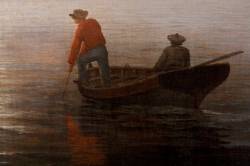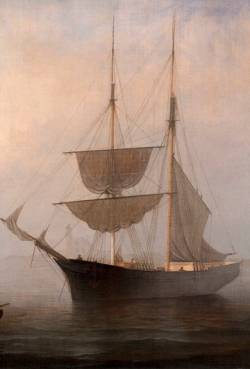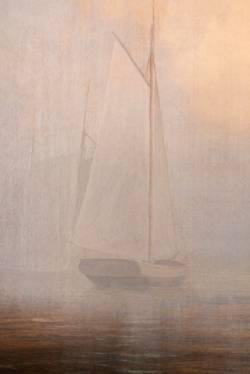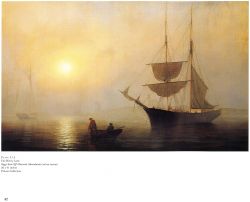loading 
Fitz Henry Lane
HISTORICAL ARCHIVE • CATALOGUE RAISONNÉ • EDUCATIONAL RESOURCE
An online project under the direction of the CAPE ANN MUSEUM
An online project under the direction of the CAPE ANN MUSEUM
Catalog entry
inv. 293
Ships in Fog, Gloucester, Massachusetts
Foggy Scene Off Gloucester, Massachusetts
c. 1860 Oil on canvas 24 x 39 1/8 in. (61 x 99.4 cm) No inscription found
|
Supplementary Images
Provenance (Information known to date; research ongoing.)
Private collection
Private collection, 2002
Princeton University Art Museum, N.J., 2015
Exhibition History
Princeton University Art Museum, Princeton, New Jersey, In Celebration: Works from the Collections of Princeton Alumni and Friends of the Art Museum, February 22–June 8, 1997., no. 214, ill., pp. 222, 225.
Published References
Granby, Alan, and Janice Hyland. Flying the Colors: The Unseen Treasures of Nineteenth-Century American Marine Art. Easthampton, MA: Hudson Hills Press, 2009., ill., pl. I.15, p. 42, text, p. 13.
Karl Kusserow. "Fitz Henry Lane's Ship in Fog, Gloucester Harbor." Princeton University Art Museum (Winter 2016).




Commentary
In 2015, the Princeton University Art Museum acquired this picture, one of Lane’s rare fog paintings. It had been in a private collection for many years and has rarely been exhibited, but is currently on display at the museum in Princeton, New Jersey.
Lane was a master painter of weather and atmosphere of all kinds. He was particularly fascinated with morning and evening transitional light and its refraction through humidity at the horizon. Few painters have come close to his fluency with all the variations of light presented by haze, mist, and, finally, fog—the most difficult of all to paint. Lane paintings of fog are extremely rare.
This is a major Lane, quite large at 26 x 40 inches, and possibly the purest expression of fog as a primary subject that Lane painted. The other great fog painting, Ship "Starlight", c.1860 (inv. 65), is primarily a portrait of the ship with the fog providing the backdrop. Here the ship is less important than in Ship "Starlight", c.1860 (inv. 65). The fog and the diffused sunlight are the primary subject; the ship is somehow anonymous, though beautifully painted. Note that its rear quarter is shading towards a blue gray. As objects recede, the atmosphere turns them to vapor, as with the ship on the left and the lighthouse behind.
It is fascinating to look at Ships in Fog and Ship “Starlight” together. The former is a study in gold and blues while the latter is silver and blues. The two could almost be pendants, a pair of paintings meant to be hung together, the gold versus silver tonal range being such a remarkable study of the contrasting warm and cool colors. Neither painting is signed nor dated. Ships in Fog seems a bit later than Ship “Starlight,” as if Lane was fascinated by the effect he had gotten with "Starlight" and wanted to push it further, going towards the gold spectrum rather than the silver.
As is typical of Lane’s great work of the late 1850s and early ‘60s, there is less foreground detail and activity overall in Ships in Fog. Seen in person, the indeterminate gold and blue tonalities in the sky pulse slightly and become the dominant impression of the picture—more like what the color-field painters of one hundred years later aspired to.
The ship is sitting off Ten Pound Island in Gloucester Harbor in the early morning. Note that the lighthouse is barely visible just above the bow of the ship. In June and July, the fogs roll in from the much colder sea and the morning sun only burns it off in stages. It often hangs over the channel where the Inner and Outer Harbor meet, just off Fort Point, exactly where Lane is standing for this view. As is so often the case with Lane, a carefully observed reality is the foundation for his work, however transcendent the interpretation.
– Sam Holdsworth